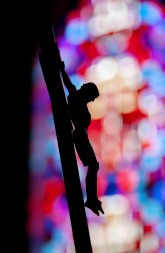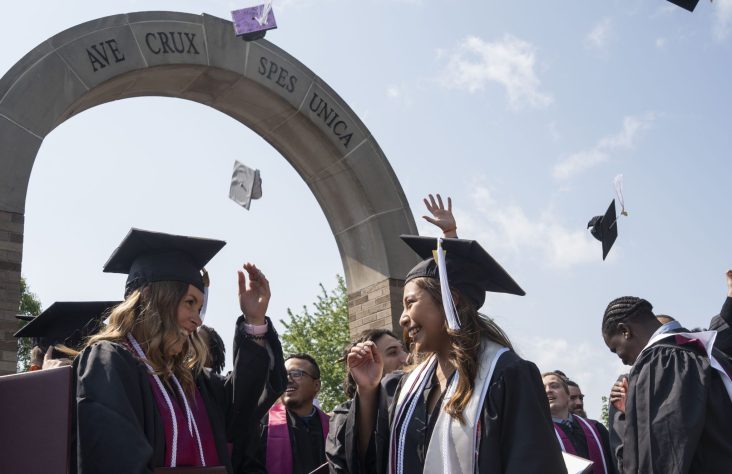March 16, 2016 // Uncategorized
Holy Week during the Year of Mercy

A crucifix is silhouetted against a stained-glass window at the chapel inside Elmira Correctional Facility, a maximum security prison in Elmira, N.Y. Good Friday, commemorates the passion and death of Jesus.
Throughout this Jubilee Year of Mercy, we are contemplating the mercy of God and our call to be merciful like the Father. Many have been studying the stories of God’s merciful actions in the Old Testament and praying the psalms of mercy. Many have been reading and meditating upon the merciful actions of Jesus, the face of the Father’s mercy, as well as His parables of mercy. This week, Holy Week, we arrive at the liturgical commemoration of the supreme manifestation of divine mercy. I encourage everyone to enter into Holy Week with particular devotion during this Jubilee Year of Mercy.
During Holy Week, we remember and we celebrate the greatest manifestation of God’s mercy, God the Father’s gift of His Son on the cross for our redemption. Jesus shared His Father’s love for us and embraced His Father’s will to save us when He suffered through the agony in the garden and the agony of the cross. This is God’s mercy, God’s love to the end. It wasn’t an abstraction. It was something totally concrete. There were whips and thorns and nails and the rough wood of a cross.
The crucifixion, which was the most horrible torture, witnesses to us the depth of God’s merciful love. He gave His totally innocent and beloved Son over to death out of love for us. The cross of Jesus is a radical revelation of God’s mercy, of the love that Saint John Paul II once said “goes against what constitutes the very root of evil in the history of man: against sin and death.” This merciful love conquers the deepest sources of evil. It is victorious. It is triumphant in the Resurrection.
This week, we will liturgically commemorate this great mystery, the Paschal mystery, the passion, death, and resurrection of Jesus, the greatest revelation of God’s merciful love, the love that redeems us, the love that conquers sin and death because it is more powerful than sin and death.
We are the recipients of the graces that flow from the Paschal Mystery: the gift of new life, reconciliation with God, redemption, liberation from sin, and the promise of the resurrection, all fruits of Christ’s sacrifice. We see these graces revealed when the soldier pierced the side of Jesus on the cross. From His Sacred Heart flowed blood and water. On the surface, this flow of blood and water showed that Jesus was truly dead. But there’s a profound spiritual reality here. The blood and water signify that Jesus’ death is the source of spiritual life for all who are in darkness and dead in sin.
In the Old Testament, Ezekiel, Joel, and Zechariah prophesied that the life-giving waters of mercy and regeneration would flow from God’s temple on the day of salvation. Well, Jesus had spoken of His body as God’s new temple. Water flowed from His pierced side, from the temple of His body on the cross. These waters of mercy, regeneration, and new life in the Spirit flow in the sacrament of Baptism. At the Easter Vigil, so many catechumens in our diocese and throughout the world will be born again of water and the Spirit. Let us pray for these brothers and sisters as they receive the new life of Christ and are incorporated into His Body, the Church.
Blood also poured forth from the pierced side of Jesus. The blood of Jesus, poured out for us from His heart, is offered to us sacramentally in the Eucharist. By eating His body and drinking His blood, we grow in communion with Jesus and share now already in His eternal, resurrected life. At the Easter Vigil, the newly baptized and those who will enter into full communion in the Catholic Church will share for us for the first time at the table of the Lord. With joy, we welcome them to the Eucharistic banquet, the sacrament that makes us one body in Christ.
The Church was born from the pierced heart of Jesus. The Second Vatican Council taught: “For it was from the side of Christ as he slept the sleep of death upon the cross that there came forth the ‘wondrous sacrament of the whole Church’” (SC 5). “As Eve was formed from the sleeping Adam’s side, so the Church was born from the pierced heart of Christ hanging dead on the cross” (CCC 766). We were born as a people, as Christ’s Church, from the heart of Christ pierced on the cross. There would be no Church without the divine mercy.
All the sacraments of the Church are gifts of God’s mercy. I mentioned the sacraments of Baptism and the Eucharist represented in the water and blood that flowed from Jesus’ side. All the sacraments are gifts from the Sacred Heart of Jesus. They commemorate and renew the Paschal Mystery of Jesus. All the sacraments are a source of life for the Church. We should work hard in every parish to bring people to the sacraments, to share with others these great gifts of God’s merciful love.
We naturally think of the sacrament of Penance as a sacrament of mercy. It is a beautiful gift given to us by Jesus the first Easter night. Pope Francis says that “among the sacraments, certainly reconciliation renders present with particular efficacy the merciful face of God.” He says: “Let us never forget, both as penitents and confessors: there is no sin that God cannot forgive. None! Only that which is withheld from divine mercy cannot be forgiven, just as one who withdraws from the sun can be neither illuminated nor warmed” (March 12, 2015). I encourage all who have not yet been to confession during Lent to go during Holy Week.
I encourage everyone to participate in the beautiful liturgies of Holy Week. The liturgies of the Sacred Triduum (Holy Thursday, Good Friday, Easter Vigil, and Easter Sunday) are rich in meaning as we remember the sacred events of our Lord’s Last Supper, His passion and death, and His resurrection. Participation in these liturgies is a great opportunity to ponder the Paschal Mystery and to experience anew God’s mercy. The Church’s liturgies help us to encounter the mercy of God which transforms our lives and makes us holy.
During this Holy Week in the Jubilee Year of Mercy, let us beseech the Lord to bestow His mercy upon us, the mercy that moved Him to carry the cross for us and to pour out His blood for the forgiveness of our sins. In the words of the Divine Mercy chaplet, we pray: For the sake of His sorrowful passion, have mercy on us and on the whole world.
The best news. Delivered to your inbox.
Subscribe to our mailing list today.






